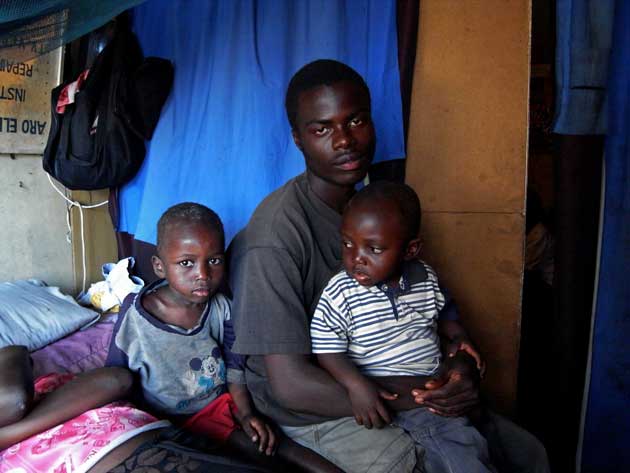The <i>IoS</i> Christmas Appeal: The brutal reality of family life in Zimbabwe
Thousands have been traumatised by the country's bloody politics, reports our special correspondent in Harare

Zimbabwe's bloody election has been displaced in the headlines by cholera and economic collapse, but thousands of people, among them many children, are still living with the physical and mental consequences of weeks of political violence earlier this year.
Two-year-old Nelson wet himself when we knocked on the door of his crowded dwelling, in one of the poorest areas of the capital. He did it again as soon as we spoke to him directly. He and his young siblings and cousins have been terrified ever since supporters of President Robert Mugabe's Zanu-PF party invaded the single room he shares with six other children and his mother, beating her and his 18-year-old brother, Nobel, and turfing the family into the street in the middle of winter.
Nobel took up the story. Their father, John, known to be a supporter of the opposition Movement for Democratic Change (MDC), had gone to South Africa to seek work, like three million other Zimbabweans – a quarter of the population. So when the Zanu-PF Youth League came calling, they seized his wife Sarah instead. "She was taken to the community hall and beaten so badly that her leg was broken," said Nobel. "I cried when I saw her," said his 12-year-old sister, Grace. "Her leg still hasn't healed, nearly six months later, and she has to walk on crutches."
Sarah spent three months in hospital. She used to sell cooking oil from a street stall to help support the family, but has been unable to work since her injury, and was out when we called, seeking help from relatives. "Even if she were here, you would be unable to speak to her," said her eldest son. "She just cries all the time."
Nobel's turn came two weeks later. "They said I was an opposition supporter and took me to the hall, where I was told to lie down," he said. "They beat me on my back and my feet for five hours. They were even beating pregnant women – three of our neighbours had miscarriages. Young girls were being raped outside the hall every night, and when they tried to report it, the police said there was nothing they could do. All the time I was there, I was afraid they might take my sister, and worried about the younger children."
When he was freed, Nobel discovered that his family's furniture had been put out on the street, and their room had been taken over by a Zanu-PF official. Although raw sewage and rubbish lies everywhere in their district, and cholera has now taken hold, their squalid accommodation is still highly desirable to people even worse off.
"We had to spend three weeks in the open in the middle of winter, with frost every night," said Nobel. "My feet were so sore that I could not walk, but I could not go for treatment, because, with my mother in hospital, there was nobody to look after the younger children." Apart from Grace and Nelson, there are two other brothers, Tarrant, 16, and Bedford, eight. Two cousins, Milo, 12, and Aqua, five, also live with the family.
In one respect they were fortunate. After three weeks the police persuaded the party official to leave, and they got back their room, in which there is one bed, shared by Sarah and the girls. The boys sleep in the "sitting room", partitioned off from the "bedroom" by a wardrobe and a curtain. Other families are still on the street, or have been forced to share their accommodation with the new occupants.
The younger children are still traumatised by the violence they have seen, according to Nobel. "Their behaviour has changed," he said. "They don't talk. They stay inside all day, and don't go out to play. They are afraid of strangers." Zimbabwe's state of chaos means nearly all schools are closed; only the youngest of the children occasionally get the chance to go to pre-school. They are also the only ones who get anything to eat in the morning. The rest eat one meal a day, usually some maize mash and vegetables.
Save the Children is helping local charities to supply families like this one with household essentials such as blankets, soap and baby clothes. It also supports day camps where young children can meet others who have suffered violence, and take part in activities which encourage them to talk about their experiences. Older children go for week-long camps outside Harare, temporarily freeing them from the family responsibilities that have been thrust upon them.
Nobel hopes one day to return to school, and become a lawyer, "so I can stand up for those being abused". He admits he still feels anger about what happened to him. "Some of the people responsible are still around," he says. "When I see them, I want revenge."
Some names have been changed
The IoS christmas appeal
£16,666 has been donated so far to our Christmas Appeal, but much more is still needed...
£21 will buy a baby kit, including sheets, cloth diapers, soap, sponge, bucket.
£30 will pay for a recreation day for a young traumatised child.
£40 will provide household goods for a displaced family, including pots and pans, blankets and soap.
£80 will foster a child for a month who has been separated from his or her family.
£170 will provide games, toys and equipment for 50 displaced children.
£200 will pay for a traumatised child to go on a week's confidence-building adventure camp.
Join our commenting forum
Join thought-provoking conversations, follow other Independent readers and see their replies
Comments